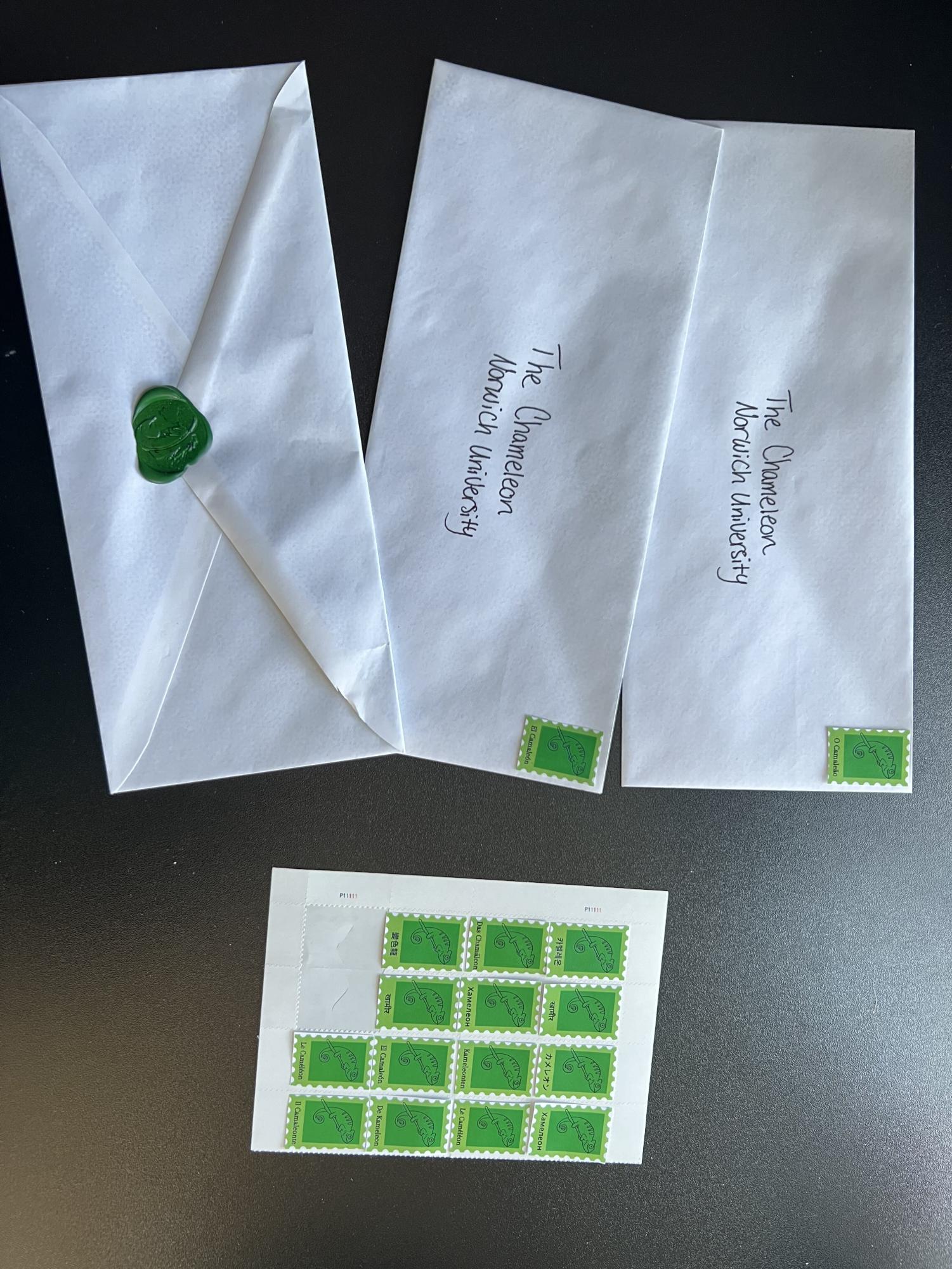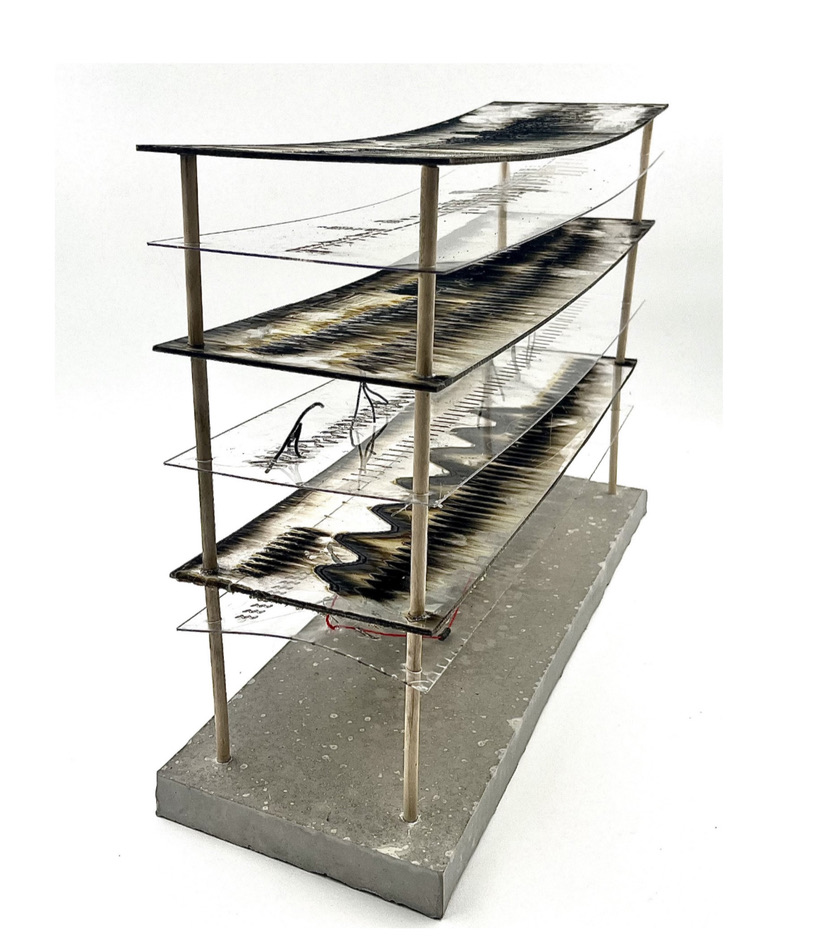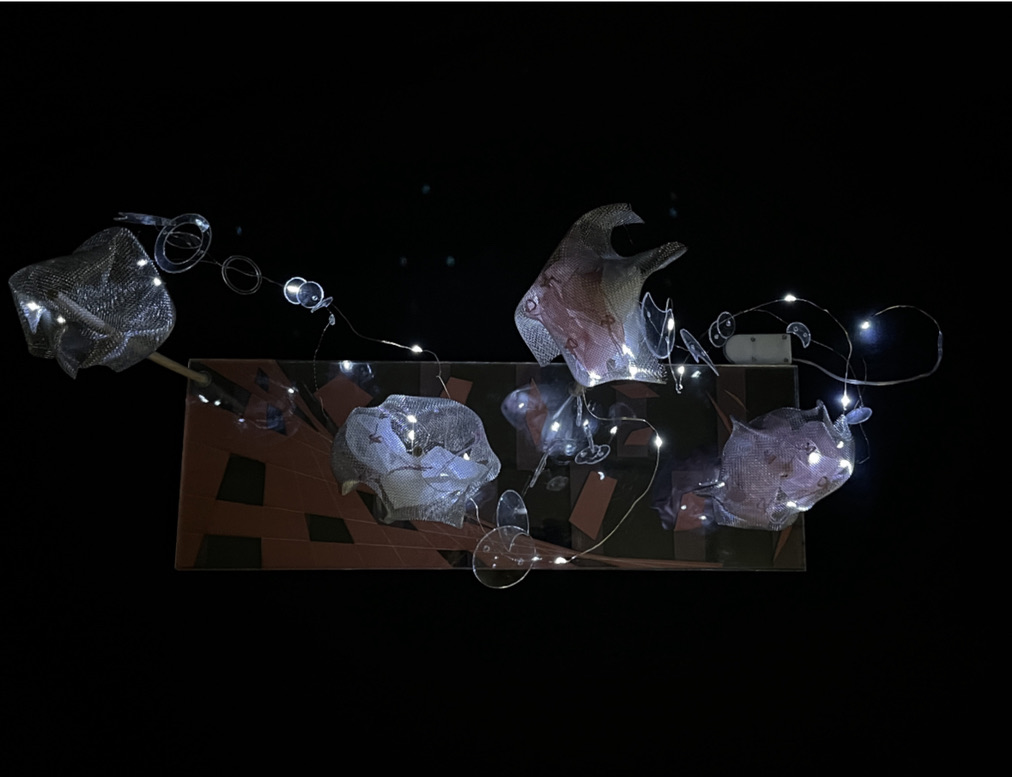
The single eyeshadow she owns is cracked and left open in the drawer from yesterday. She looks in the mirror; mascara from yesterday spackles her eyelids. “Shit…” her head throbs. Her phone vibrates from the counter next to her. She turns off Do Not Disturb for the first time in days. Fifty-five texts chime through at once. Fifteen come from her mother, all of which she ignores. Endless random Instagram reels and group chat notifications stream through. She puts her phone down.
Her closet stares back at her. Piles of clean and dirty clothes make homes on the floor, a shadow of what used to be the best part of her day. Now, it seems too much. Her only work outfit remaining sits in front of her. Sliding them up, she remembers why. “Where did I put that shapewear…” she mutters, hopping around her room searching for the shorts she hasn’t worn in months. With her head, still throbbing, she can hear her phone vibrating in the distance.
With a huff and a puff, they come on. She wanders back over to her bathroom and saw no one, other than her mother, is calling. With a gulp she picks up. “Hey mom-”
“WHERE HAVE YOU BEEN” her mother’s distinct shriek floods her eardrums.
“Ive-Ive been busy with work and job hunting and and I…”
“You what?” “Did you hear back about the position in Quebec?”
She sighs. “I didn’t get it…not enough experience I guess.” She drowns out the rest of the conversations, interrupting with a “Oh really” or “Okay”. Eventually, she hangs up the phone.
Opening the cabinet next to the overflowing recycle bin, she sighs as she remembers she used her last mug yesterday morning. She gras the last Solo cup off the counter. Her Mr. Coffee pot moans as she once again fired it up, warming up the pot she made hours ago.
She begins to rummage through her purse for her medication; uppers for this, downers for that, her personal cocktail. The bottle is suspiciously light.
It’s empty.
She aimlessly walks around her apartment—through her living room and out to the fire exit—tripping over last night’s takeout containers and cans. The breeze flows through the window, surprising her. A loud horn interrupts her coffee-scented daydream.
“What the fuck!? Again?” She thinks . The loud shrieking and clashing of downtown construction greets her for another day of relentless interruption. “I’m going to be at least twenty minutes late for work with this delay. Hopefully, he won’t notice.”
She is a receptionist at a law firm uptown. The walk is the same every day: just twenty-five short blocks by foot or a forty-five-minute subway adventure.
The corner store sits to the right of her apartment complex. It is run by an older couple, but she only sees Paul. He knows her order by heart, a medium hot cup with milk and sugar, not too dark. He is always open, and, sometimes, leaves the key under the mat for her to grab her cup before work. He always sees that she makes it up to her door after dark.
The outside is a faded green color, the windows now barred from years of robberies, and the hinges on the door are rusted. One wall is now a public art gallery of sorts, covered in posters for events and random graffiti now faded from years of pressure washing. They have a little red bell above the door that signaled someone is entering.
“Good morning, Paul, the usual, please.”
The scent of the place comforts her. It smells of homemade chicken soup and lavender. This contrasts with Paul’s intimidating appearance, faded tattoos, heavy feet, and broad shoulders. His smile, on the other hand, holds a warm and inviting presence .
“Hey, you forgot my milk…”
He has already moved on.
Her hair falls into her face, taunting her with the reminder that for the next sixteen hours, it must be pulled into a slick-back pony. Company policy.
The door swings open with tremendous force as the kids pushed through for their daily dose of Red 40 and liquid sugar before the 7:45 train to school.
“Shit!” She looks down. Coffee covers her brand-new work heels, exactly 3.5–5 inches tall, in a rich, earthy rust color—one of the three color families she is allowed to choose from.
“Sorry!” she hears as one of the kids disappears out the door.
They cost $200.
“See ya later, Paul.” She continues to work, her mind racing as she concocts excuses for her boss.
Her walk usually consists of a podcast. Today, her favorite show featurs someone she once knew. A girl she went to school with; they were in the same degree program. She is talking about a job she recently returned from in Japan; some magazine sent her there to interview some protesters. The article was huge.
With a sigh, she switchs back to her playlist.
Her office is the epitome of wealth. Huge marble pillars line the inside hallways, fresh polish shimmering in the beautiful bright lights. It makes her sick. Men in black and grey suits wander the building, none of which bat an eye at her. She greets the janitor, Susan, on the way in, her lavender perfume overtaking her senses. She basks in it for a few minutes. Her
heels clack on the black tiled floor as she approaches the grand elevator in the back of the main entrance. With a deep breath, she clicks the 4th floor.
“You’re late again—second time this week.” She knows. She has counted every minute past 8:30. Today, it was twenty-seven minutes. Monday, it was thirty-three.
“They started working on that new apartment complex on 34th Ave—made me go around six extra blocks of traffic. Trains are delayed by forty-five minutes across my end,” she says, avoiding eye contact. She hopes he won’t smell the lies on her breath.
“Leave earlier tomorrow. And next time, use less perfume—it smells like a Starbucks in here.”
Success.
The workday is always the same: bat her eyes at Mr. Whose-a-what-its, who has a 50% share at Blah-Blah-Company. It’s okay that Mr. What’s-his-face does that—he pays blah and blah for this and that. She hardly knows why she applied here anymore. A picture of her degree in journalism collecting dust on her office wall flashes in her mind.
The breeze is cold as she exits the suffocatingly warm building after work. It’s rush hour. The streets are packed with people in designer coats and leather handbags worth more than her salary. There’s not a cab in sight. The subway is still delayed
“Evening, Paul.” The familiar blinding lights of the corner store consume her as it always does on the way home. As she saunters to the cooler, she stops in her tracks. It’s empty.
“Hey, you’re out of them again!” She throws the cooler door shut and makes her way to the register.
“Can I get a pack of—”
“Marlboro Reds and a pint of Stoli?” Paul interrupts her with a smile that screams judgment.
“Yeah, that’s it.” She slams a $20 on the counter and leaves.
A year ago, Paul didn’t even know who she was.
Silence greets her at her door once again. Without bothering to turn on the light, she slinks over to the fire escape, the familiar sound of clicking as she opens the bottle. It floods her tongue and throat with a welcome burn.
Her nightly routine begins.
The ledge of the escape has become her throne. It sits on the line between safe and not. She can feel the wind from eight stories below, her feet forever taunting her with the possibility of greeting the pavement.
The bottle drops from her hands.
“Shit!” She watches it fall.
She gets up to light her cigarette. A sudden buzz in her back pocket makes her check her phone for the first time all day. Seventeen missed calls from her boss, four emails, and three texts.
“At 11:30 p.m.?” She wonders if it has really been four hours since she got home. She didn’t even notice the sunset. She sets a reminder to call in sick in the morning. She kicks something on her way in. She left a rack outside to keep cold last night.
“Morning, Paul.” Her coffee is waiting for her once again, milk on the side with a note. “In the bathroom, it’s on the house today—closing early tonight.”
Great. She has beaten the kids to the store; it feels eerie. She can feel her own breath on her lips. She looks at her watch. It’s 3:45 a.m.
“How did he know I was awake?” She looks up. The perfect view of her balcony sits at an angle to the shop window, a perfect view of her stash.
How long has he been watching?
“How did I get here?”
Her vision begins to get blurry. The ground is getting closer to her. Blood fills her mouth.
“What’s happening?” She gasped gasps, clutching the ledge, her heart racing faster than a subway train on an express track. She must have drifted off at some point, her mind spinning like the fluorescent lights in the office. She sits with it for a moment before reality hit her again.
“I can’t fall. Not now.”
But the pull is there: gravity, destiny, or just plain chaos calling her to the ground. The streets buzz with life below, the sound of the drunk and broken fills the air, oblivious to her unraveling. She blinks hard, fighting back the edges of darkness creeping into her vision, each blink feeling like a heavy eyelid shutting down on a world she no longer understands.
Panic sets in, drowning out the sounds of the city below, honking horns and the distant rumble of trains. She staggers backward, her heart racing. The ground feels like a distant memory, and all she can hear is the drumming of her pulse in her ears.
“Shit. Shit. Shit.” She repeats the mantra as if it could anchor her in the chaos. What is happening to her? Is she really that far gone?
Her apartment, a patchwork of shadows and clutter, calls to her, but fear holds her still, frozen between the thrill of the fall and the safety of the inside. She takes a shaky step back, her heels digging into the metal of the fire escape as she catches her breath, each inhalation filled with the smell of rust and regret.
Suddenly, her phone buzzes again, a harsh reminder of the outside world. One missed call—her boss. She glanced at the screen: 1:17 a.m. Her heart drops. Did she really just lose hours? The panic begins to claw at her.
“Focus,” she whispers to herself. The cool metal of the railing bites into her palms, a tether to this reality, even if it feels like a cruel joke. She staggers back, her thoughts a chaotic mess of the last few months: the endless workdays, the hollow conversations, the nights spent waiting for something—anything—to change. She inhales deeply, the stench of the city mingling with her perfume, a burning reminder that she is still here, still breathing.
“I’m just tired,” she says, as if convincing the world around her. But the truth is heavier than the weight of the sky pressing down on her shoulders.
“I’m so tired.”
She glances out, her neighbor across the way turns on the light. For a split second, she sees her reflection in the glass. Who is that girl staring back at her? The makeup is smudged, the hair a tangled mess, and the eyes rimmed with fatigue. It is a stranger, lost in the neon glow of a city that never seems to care.
“What do you want?” she shouts into the night, her voice cracking. “What am I supposed to do?”
Silence envelopes her, a stark contrast to the raucous life of the city. In that quiet moment, she hears something deeper, a faint whisper from within: “Let go.”
Her grip falters, the weight of the bottle once in her other hand suddenly feels like a burden too heavy to bear. “Let go,” she repeats, her heart racing with a mixture of fear and exhilaration.
What now? she asks the universe, but the answer remains a mystery, swirling in the haze of smoke and streetlights. The weight of expectations and responsibilities begin to fade, and with it comes a hint of clarity.
“You deserve more,” she whispers to herself. The thought, though small, sparks a flicker of hope in her chest.
Her phone buzzes again, a reminder of the world waiting for her back inside. Seventeen missed calls from her boss, four emails, and three texts still flash on the screen, but for the first time, she doesn’t want to answer. “I’m not that girl anymore,” she says, a smile breaking through her despair.
With a deep breath, she steps back from the ledge and turns toward the door, her heart steadying. She takes one last look at the city sprawling beneath her, alive and messy, just like her.
“Tomorrow,” she vowed softly, “I’ll choose.”
With that, she opens the fire escape door and steps back into her apartment. The familiar clutter greets her, a chaotic collection of takeout containers, clothes strewn across the floor, remnants of a half-lived life.
As she flicks on the lights, the fluorescent glow from the overhead lights bleed into her space. But this time, instead of feeling trapped, she feels a spark of possibility. “I can start over,” she murmurs, the words feeling foreign yet liberating.
She sits down at her cluttered desk, pulling the dust-covered laptop from its resting place. “Let’s see what’s inside,” she says to herself, opening her emails. As she scans them, one chain caught her eye. It is a job she applied for months ago.
It is dated 5 months prior. They want to take her on as an editor. Her heart drops. The next one is dated 2 weeks later. They found another candidate.
She shuts her laptop.
I forget things.
Memory is a fragile wisp, constantly slipping through my fingers, the value of them, priceless, as an artist’s work is always worth so much more once they are dead. Sometimes I wonder what a person is with no memories, a shell sentenced to being empty forever? There is little value to a blank canvas, its riches held only in possibility. A life sentenced to melting away to be bare, destined to be painted with endless scenes overlapping yet never coming to focus. The ultimate gift to a paintbrush, an eternity of creation, and yet it’s ultimate despair to never leave its mark. I wonder if I’ve ever lived the same moment more than once, if I’ve experienced love, loss, laughter, grief.
I often dance to songs my mind doesn’t know the words to, my feet remembering the steps. The rhythm carrying me through a past life I can’t quite grasp. Harmonies and bridges cradling the empty space, promising to fill the void. It’s not something you have to know to enjoy, to feel. I feel the soft breaths of existence, like the whisper of a melody brushing against my skin. I feel hints of emotions, the dull echo of something almost empty.
When memory is so fickle, and my hands are torn and sore from hanging on for so long, refusing to let the moments disappear into the abyss, I hide them. Each day is stored carefully in a box. Pieces of shattered glass explain the scars on my palm, shirts too small promise a childhood I can’t assure you was there, and smooth stones affirm that I’ve spent many days by a riverside. Rivers hold memories, you know, the water is always changing, moving on, but it leaves behind proof that it was there. The smooth stones are my favorite, the water eroding the rough surface behind. Sometimes, if I rub my thumb over the pebbles long enough, hard enough, I think the rock may hold my memories too, just as it does for the river.
So, I entrust my memories to the ground. Soil cradling these boxes, held in the way a motherless baby is held. Heavily. The ache of the void less, knowing that they are safe from my deteriorating mind.
Sometimes I dig them up. The little stones are the only indication of any existence. A garden of unmarked graves. The calendar of my life lost to me under the cover of worms and dirt. I’ll sift through the contents, waiting for the click of a memory to fall into place. A face to gaze upon me and to see more than a half-developed frame. It never does. But on occasion, I unearth the keeper of a letter, a box much smaller than the rest. My knees covered in soil much richer than any I’ve seen before, the blackened crescent moons of my nails filled with the secrets of a girl I grieve for. The dirty fingerprints marring the pristine pages promised I had held this life in my hands before they became calloused and assured I would hold it again as they wither with age. Its contents pledged a life wondrously beautiful, wicked, and utterly lost. The existence, her secrets blissfully absent from time, only persevered in ink and parchment. Until I find myself digging them up once again.
Your donation will support the student journalists of Norwich University. Your contribution will allow us to purchase equipment and cover our annual website hosting costs.


